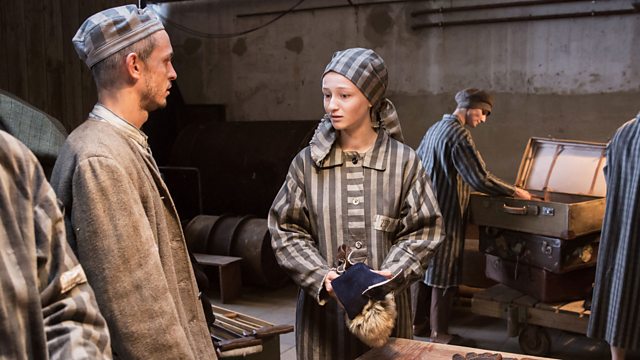
Episode 8
Eva is already an orphan when she arrives at Auschwitz concentration camp. She hopes to meet her friends from the Theresienstadt children's choir, who were deported before her.
Tha Eva (14) mar-thà na dìlleachdan nuair a ruigeas i campa Auschwitz. Tha i an dòchas a caraidean bho chòisir chloinne Theresienstadt a lorg. Gu h-iongantach tha i a’ lorg a caraid Renata ach tha choltas oirre gu bheil i air a dòchas a chall. Tha Eva a’ dèanamh a dìcheall gus Renata a chumail beò. ’S e ceòl a tha a’ toirt neart do dh’Eva agus ’s e an ceòl an aon rud a leigeas leis a’ chlann-nighean dìochuimhneachadh bhon uamhas anns a bheil iad. Ged a tha Eva a’ cuideachadh gus Renata a chumail beò chan eil càil a choltas fhathast gun tèid Auschwitz a shaoradh.
Ciamar a b’ urrainn do nighean aois ceithir bliadhna tighinn beò à Auschwitz? Seo a’ cheist a bhios an t-ochdamh earrann a’ faighneachd agus e gar toirt dhan t-saoghal aig a’ champa a b’ iomraitiche ann an linn nan Nadsaidhean. Seach campa-obrach no campa-sgrios sam bith eile, tha Auschwitz a’ comharrachadh a’ Holocaust. Cha ghabh na thachair an sin a thuigsinn no a mhìneachadh. Ge-tà, bha Auschwitz ann agus bha na thachair ann fìor. Bha fulangas nan daoine agus an t-acras cunbhalach ga dhèanamh doirbh do dhaoine dàimhean is càirdeas a stèidheachadh agus bha seo mar phàirt de sgrios nan daoine. A dh’aindheoin sin bha càirdeas agus dàimhean anns a’ champa. Bha fiù ’s ceòl ann, le orcastra nam prìosanach a’ cluich aig geataichean a’ champa an uair a bhiodh càch a’ dol a dh’obair, ged nach robh seòmraichean a’ ghas fad às. Os cionn gach rud bha ceòl a’ giùlain dòchas agus air a’ cheann thall shàbhail e cuid de na prìosanaich. Bha e mar chriomag de dhaonnachd ann an Ifrinn Auschwitz.
Fourteen-year-old Eva is already an orphan when she arrives in Auschwitz concentration camp. She hopes to find her friends there from the Theresienstadt camp children's choir, who were deported before she was. Miraculously, she finds Renata, but the former soprano appears to have given up on life. Eva tries with all her might to keep Renata alive. It is her music that gives Eva the strength to keep going, because only that will make it possible for the two girls to escape the hell in which they find themselves. And Eva actually manages to bring Renata back from the edge. But a rescue or indeed liberation from Auschwitz is not yet in sight…
How could a 14-year-old girl survive Auschwitz? The eighth episode of "Kids of Courage" asks this question and takes us into the world of the most infamous Nazi concentration camp of them all. Like no other concentration or extermination camp, Auschwitz is synonymous with the Holocaust. What happened there surpasses anything we can imagine and cannot be explained. But Auschwitz existed. Auschwitz was real. The existential plight, the constant hunger experienced by everyone made it hard for solidarity and inter-personal relationships to exist – part of the extermination system.
And yet there was solidarity and there were inter-personal relationships. There was even music: the prisoner's orchestra played music at the entrance to the camp, when the other prisoners went to work. Not far away, the gas chambers waited. Even music was used perfidiously by the Nazis for their own ends. But despite all, the music carried hope in it and was even a lifesaver for the prisoners. A small piece of humanity in the hell that was Auschwitz.
Last on
More episodes
Previous
Next
You are at the last episode
See all episodes from Gaisgich Òga an Dàrna Cogaidh (Kids of Courage)
Credits
| Role | Contributor |
|---|---|
| Narrator | Patsi MacKenzie |
| Writer | Morag Stewart |
Broadcasts
- Tue 12 Nov 2019 20:30
- Sun 17 Nov 2019 20:30
- Sat 24 Apr 2021 20:30
- Thu 21 Apr 2022 19:00
- Tue 26 Apr 2022 19:00
- Thu 12 Jan 2023 19:00
- Tue 17 Jan 2023 19:00
- Thu 30 Nov 2023 19:00
- Tue 5 Dec 2023 19:00
